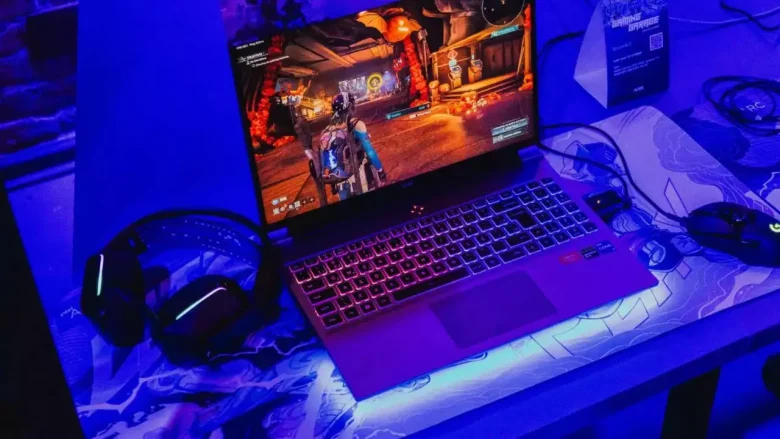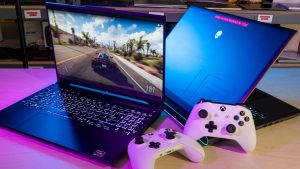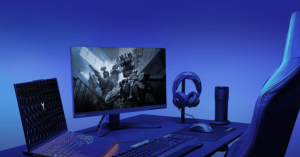Finding a gaming laptop that’s both affordable and offers high performance can be tricky. If you want to get the best performance without blowing your budget, it’s crucial to know what to look for, especially with the variety of options on the market. Find the best budget gaming laptops with these essential guides.
1. Understand Your Gaming Needs
Before you start looking for a cheap gaming laptop, it’s important to know what kind of gaming laptop you need. Think about the types of games you play and the system specs they require. If you like to play demanding AAA games at high graphical settings, you’ll need a laptop with a great GPU and CPU. You may be able to use a cheaper laptop to play simpler, more casual games. By identifying your needs, you can reduce the number of features you can purchase and save money on extra features.
2. Prioritize GPUs
The most important component of a gaming laptop is the graphics processing unit (GPU), which determines the overall gaming experience and graphics quality. Choose a budget gaming laptop that includes at least a standard dedicated GPU, such as the AMD Radeon RX 5500M or the NVIDIA GeForce GTX 1650. With these GPUs, you can play most games at medium to high settings without experiencing noticeable frame drops that affect gaming performance. A good mix between performance and price.
3. Find a Reputable CPU
To ensure a smooth gaming experience, the GPU and CPU work together. Look for laptops with quad-core processors such as AMD Ryzen 5 or Intel Core i5 when looking for budget gaming laptops. These processors are cheaper than high-end processors and offer sufficient gaming performance. Avoid dual-core CPUs, as they may not be able to handle multitasking and more demanding gaming.
4. Consider Memory and Storage
For a seamless gaming experience, you need sufficient RAM and storage. For a budget gaming laptop, a minimum of 8GB of RAM is a good target. This amount is usually sufficient for most games and allows for efficient multitasking. When it comes to storage, laptops with a solid-state drive (SSD) should perform better than laptops with a traditional hard disk drive (HDD). Overall SSD performance is improved and loading times are faster. You should look for at least 256GB of SSD storage, but 512GB is better if that fits your budget.
5. Check the Display Quality
The overall quality of a gaming laptop is affected by the display. Full HD monitors (1920×1080) offer a reasonable compromise between performance and resolution, making them a good choice for those on a budget. For budget laptops, higher resolutions (such as 4K) are generally unnecessary and come at a cost. Also, consider the refresh rate of your monitor. While 60Hz is the norm, some budget models come with 120Hz or higher, which can result in smoother gaming.
6. Evaluate Battery Life
Battery life is crucial to consider, especially if you plan on using your gaming laptop on the go. Budget gaming laptops often have shorter battery lives due to their powerful components. Still, look for a machine with at least 4 to 6 hours of battery life with average use. Keep in mind that gaming can drain the battery quickly, so getting a longer battery life will give you more options when traveling and using your device when there are no power sources nearby.
7. Check Build and Design Quality
The durability and overall user experience of a gaming laptop can be affected by its build quality and design. If you’re looking for a budget model, it’s crucial to choose a laptop that’s both comfortable to use and well-built. Look for a laptop with a responsive touchpad, a sturdy keyboard with ample key travel, and a durable frame. While budget laptops may not come with high-end components or features, a solid build will ensure longevity and enhance the user experience.
8. Check Reviews and Model Comparisons
Take the time to read reviews and compare different models before you decide to buy one. User reviews can reveal a laptop’s reliability, performance, and potential issues. To ensure you’re getting the best value for your money, compare the features and costs of different models. Gaming laptop websites often offer comprehensive reviews and benchmarks to help you make an informed decision.
Conclusion
By understanding your gaming needs, ranking key components like CPU and GPU, and considering other aspects like RAM, storage, and display quality, you can find the best budget gaming laptop. By following these recommendations and carefully weighing your options, you can find a gaming laptop that fits your budget while delivering great performance and value. By taking the right steps, you can have a satisfying gaming experience and stay within your budget.
FAQs
1. What are the most important components of a budget gaming laptop?
The GPU (graphics processing unit) is a key component of budget gaming laptops. To meet the graphical demands of modern games, a powerful GPU is essential. GPUs with a decent combination of performance and price include the NVIDIA GeForce GTX 1650 and AMD Radeon RX 5500M, which are good choices for entry-level models.
2. What is the right amount of RAM for a budget gaming laptop?
It is recommended that budget gaming laptops come with at least 8GB of RAM. This amount is usually sufficient for most modern games and ensures seamless multitasking. For more demanding activities, some gaming laptops can come with 16GB of RAM, but for cheaper models, 8GB is usually sufficient.
3. Is SSD essential for gaming laptops?
For gaming laptops, SSD (Solid State Drive) is essential. It offers faster load times and better overall performance (hard disk drive) compared to traditional HDD. To ensure faster boot times and faster loading of games, look for gaming laptop models under $250 that come with at least 256GB of SSD storage.
4. What are the optimal refresh rates and screen resolutions for a budget gaming laptop?
For budget gaming laptops, the best Full HD resolution (1920×1080) is recommended. This resolution offers a good compromise between performance and image clarity. The usual refresh rate is 60Hz, although some cheaper versions have higher refresh rates such as 120Hz or 144Hz, which can improve the overall experience and allow for smoother gaming.
5. How important is battery life on a gaming laptop?
Compared to other elements, battery life is important for gaming, but not very important. Because gaming laptops have robust components, battery life is usually shorter. Choose a laptop with at least 4-6 hours of battery life with normal use, but keep in mind that prolonged gaming can significantly reduce battery life.



